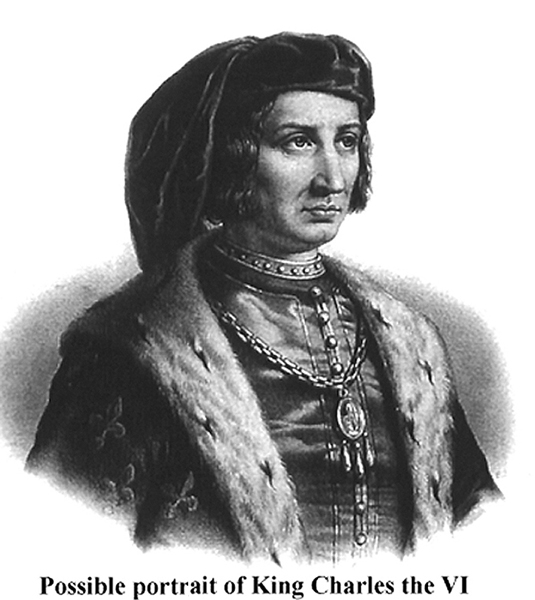
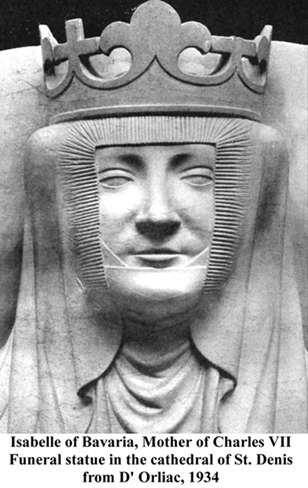
Historic Background
To The Hundred Years' War
It is important for the reader to have some understanding of the background to the Hundred Years' War and the part that Jeanne played in ending it. The entanglement between the English and French Crowns began in 1066 with the invasion of England by the French Duke, William of Normandy, who conquered England and became its monarch. Once he was king, William installed other Norman nobles to the peerage so that he could take full control of the country. These nobles maintained their French heritage, language and family ties to those who ruled in France.
This entanglement erupted into armed conflict when the King of France, Charles IV, died in 1329 without a male heir. The closest relative was Edward III of England who was the late king's nephew. The French nobles rejected him and chose instead one of their own, Philip IV, a cousin to the late monarch. To justify their choice the French nobles cited the newly framed "Salic Law," which disallowed inheritance through a woman.
At first Edward consented to their choice but eight years later, in 1337, he changed his mind and declared himself King of France and England. With this act, the Hundred Years' War began. This was not a continuous war but a series of wars broken by the occasional truces and periods of peace.
The nobles from both sides relied heavily on mercenaries from Germany, Scotland, Spain and Italy, to fight for them. When the nobles had no further need of their services, they immediately discontinued payment, leaving the mercenaries to fend for themselves. These soldiers made a profitable living by pillaging and plundering French towns and villages, which caused appalling suffering for the common people. These marauding bands of mercenaries became known as Brigandines, named after the short chain mail coat they wore called a 'Brigandine.' In modern French and English the word evolved into Brigand meaning bandit, ruffian or crook.
The tide of war ebbed and flowed first to the English then to the French and then back to the English. In 1392 King Charles VI became insane and his two uncles, the Duke of Orleans and the Duke of Burgundy, began struggling with each other for control.
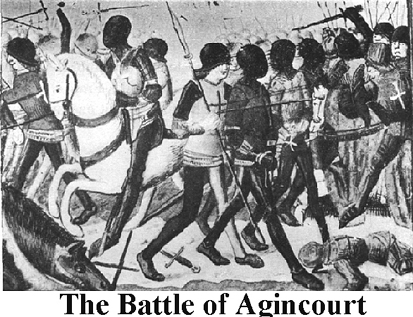
This struggle erupted into a full civil war with both sides asking for English help to defeat the other. Taking advantage of the chaos, King Henry V of England renewed his claim to the contested throne and invaded France in 1415.
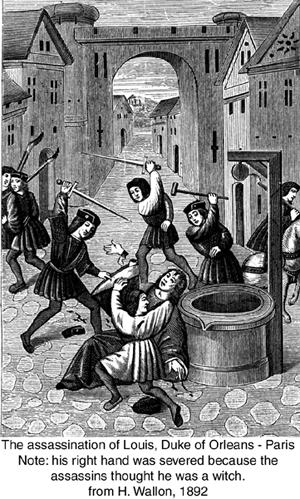
At the time of Charles VII's conception Queen Isabeau was having an affair with Louis the Duke of Orleans so either the king or the Duke could have been the Dauphin's father. The Duke of Burgundy's men murdered the Duke of Orleans in 1407.


Isabeau and King Charles VI had other children but by 1420 all the male heirs to the French throne other than Charles were dead. This made Charles the last direct male descendent of the King.
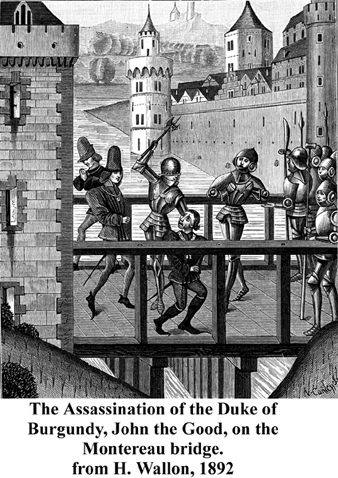
Queen Isabeau took up with the Duke of Burgundy even though Philip was allied with the English. In 1420, Isabeau, in association with the Duke of Burgundy signed the Treaty of Troyes with England. This treaty disinherited the Dauphin, Charles VII, from succession to the French throne. Upon the death of Charles VI, the throne would go instead to the son of Henry V, king of England. The term 'dauphin' referred to the son of the French monarch who was to inherit the throne and become king. The English equivalent is the Prince of Wales.

The Queen mother, Isabeau, declared Charles to be the bastard son of the Duke of Orleans and not the son and heir of Charles VI. She heaped insult onto injury by giving him the disparaging title of "the so-called Dauphin." No one totally disputed the claim of his mother until Jeanne, through divine revelation, emphatically declared Charles to be the true son of the late king.
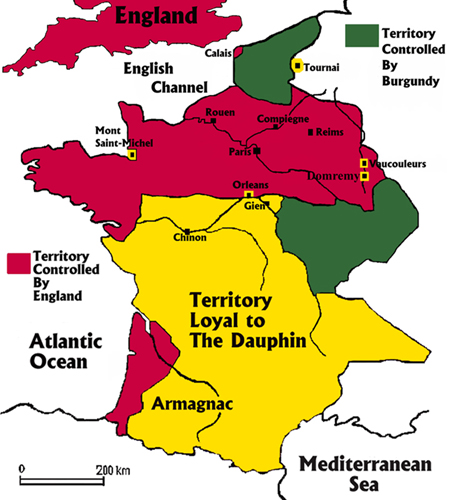
The kingdom of France, in a state of total disarray, seemed doomed to be divided between England and its ally, Burgundy. The English controlled the area north of the Loire that extended from the German border on the east to the Atlantic Ocean on the west. They also held the city of Calais and its environs in the north and Guyenne, a renamed portion of the old province of Aquitaine, in the south. This area bordered Spain on the south and the Atlantic Ocean on the west. The Burgundians held the central portion of France along the German border. They also held an area called Flanders in the north that is now the countries of Holland and Belgium. The reminder of the territory south of the Loire River remained loyal to the Dauphin, Charles VII.
In 1422, upon the death of his father, the Dauphin, Charles VII, although personally tortured by doubt as to his right to claim the throne, nonetheless declared himself King of France. Yet he did nothing more because he lacked the will. Charles was a homely, passive, weak-willed and timid young man, who surrounded himself with strong-willed, greedy and ambitious men.
The chief of these was Lord George de La Tremoille. This Lord was not interested in seeing Charles regain his throne, as this would interfere with his position of dominance at court. Instead La Tremoille and his group were very happy to maintain the status quo while they squandered the kingdom's wealth. Having strong ties to both sides Lord La Tremoille played the one against the other for his personal gain. He was fabulously wealthy and he used his wealth to make the Dauphin Charles financially dependent upon him. Because Charles owed him enormous sums of money, Charles tried to pay the debt by signing over pieces of his loyal territory to Lord George who in turn sold it to the highest bidder, be he French, English or Burgundian.

In 1428, the English Regent, the Duke of Bedford, wanted to expand English domination over the territories south of the Loire River. He decided the best way to obtain this goal was to attack the city of Orleans, whose Duke was a prisoner in England.
Orleans, located on the north bank of the Loire River, is in the central portion of France. The moment the English captured this city, their army could rush unopposed into the remainder of the Dauphin's loyal territory, conquer it and thereby successfully win the struggle for the French throne.
